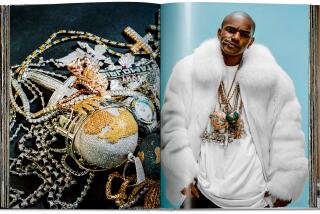STEP ACROSS THIS LINECollected Nonfiction1992-2002By Salman RushdieRandom...
STEP ACROSS THIS LINE
Collected Nonfiction
1992-2002
By Salman Rushdie
Random House
404 Pages, $25.95
*
“Step across this line,” and you’ve crossed a frontier. Or committed a transgression. Or perhaps both.
The question of lines and what it means to cross--or refuse to cross--them resonates throughout this collection of nonfiction by Salman Rushdie, who, merely by writing a work of fiction, committed a transgression amounting to a capital crime in the eyes of the Ayatollah Khomeini, who, in turn, exhorted his followers to commit a far greater transgression than Rushdie ever dreamed of.
The title Rushdie has given this collection, “Step Across This Line: Collected Nonfiction 1992-2002,” comes from its concluding essay: a far-reaching and imaginative meditation on boundaries--physical, geographical, intellectual, legal, artistic and ethical. Beginning in prehistoric times, when the first sea creature heaved itself past the water’s edge onto dry land, Rushdie takes us on a colorful journey through history. Highlights include a medieval Sufi legend about birds, some thoughts on “transgressive” art, a reconsideration of Frederick Jackson Turner’s thesis about the importance of the frontier in American life and reflections on the tides of human migration across borders.
The rest of the pieces in this collection written over the past 10 years include other essays, opinion columns, speeches, lectures and letters to the editor. Many are quite short; some, little more than quick reactions to events. Others are more thoughtful and considered. Most are informed by their author’s unimaginably frightening firsthand experience of being singled out as a human target by the fatwa issued against him in 1989. But there are also some on utterly different topics, such as the opening essay, a rumination on one of Rushdie’s favorite stories, “The Wizard of Oz.” Midway through the collection, there’s a long and fascinating account of Rushdie’s tension-filled but ultimately joyful return to his native India, after many years of being unable to travel there.
This book is full of so much that is “relevant” that the very word seems inadequate. Rushdie discusses Islamic fundamentalism, terrorism, the uneven response of the West to these threats, the plight of writers and artists in Muslim countries, the dangers of Hindu fundamentalism, the scandal of the 2000 American presidential election, the vexing question of Kashmir and the continuing turmoil in his native land, which he sees as part of the tragic and unfinished story set in motion by its 1947 partition, an artificial line that he believes led to greater divisiveness and alienation. Although decidedly pro-India, he deplores its anti-Muslim violence, is deeply suspicious of the Hindu nationalists there, and is generally dismayed at the level of poverty, corruption and callousness.
Several of the pieces, written in the aftermath of Sept. 11, 2001, express Rushdie’s outrage, not only at the terrorists’ mass murder, but also at the unfairness and stupidity of the anti-American sentiments expressed in its wake, not only by Islamic fundamentalists, but also by Britons and Europeans. Hardly an uncritical admirer of U.S. policy himself, Rushdie nonetheless deplores the moral relativism that would shift responsibility for the crime to the victim: “To excuse such an atrocity by blaming U.S. government policies is to deny the basic idea of all morality: that individuals are responsible for their own actions.”
Again and again, Rushdie returns to a point that may seem very obvious, but clearly needs to be made, again and again: To be in favor of intellectual, artistic and personal freedom is not the same as conceding that no limits on behavior should be imposed. “The evil that men do, in Shakespeare,” he reflects, “is always a kind of excess. It has to do with the denial of limits, the willingness to cross any moral frontier. Goneril and Regan, Lady Macbeth, Iago.... Whereas Hamlet is the opposite: a man so beset by moral qualms that it takes him an eternity to act. The great question ... [h]ow far is too far, how far is not far enough?--is at the heart of Shakespeare’s world; also, now, of ours.
“The problem of limits is made awkward for artists and writers, including myself, by our own adherence to, and insistence upon, a no-limits position in our own work. The frontierlessness of art has been and remains our heady ideology. The concept of transgressive art is so widely accepted ... as to constitute, in the eyes of conservative critics, a new orthodoxy.”
Much has been said and written about Rushdie’s perceived vanity, irascible temper and various other traits. This, alas, is part of a broader media trend to reduce serious political and social issues to gossip and cocktail party chatter. It has clearly not escaped Rushdie: “Even now, in Britain, there is a powerful lobby that regularly denigrates my character. It is hard for me to be my own advocate in this matter, hard for me to insist on my own value.”
But, as Rushdie goes on to remind us, the value at stake is not the question of one man’s personality or even the quality of his work: It is a question of how much--or little--we value freedom of expression. “[W]e are witnessing a war against independence of mind, a war for power,” he warns us. “Religious persecution is never a matter of morality, always a question of power.”
Intellectual freedom, in Rushdie’s view, is “not in itself the answer to the question of morals but the conversation about that question .... [I]t is much more than mere relativism, because it is not a never-ending talk-shop, but a place in which choices are made, values defined and defended.”
More to Read
Sign up for our Book Club newsletter
Get the latest news, events and more from the Los Angeles Times Book Club, and help us get L.A. reading and talking.
You may occasionally receive promotional content from the Los Angeles Times.






